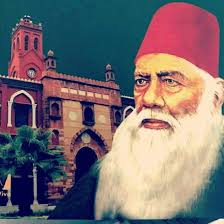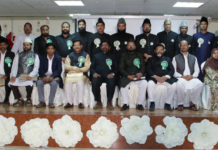The establishment of Mohammadan Anglo Oriental (MAO) College in 1875 marks one of the most important events in the educational and social history of modern India. The MAO college was originally affiliated to Calcutta University, and was transferred to Allahabad University in1885.
In 1920, an act of Indian legislative Council elevated the MAO College to the status of a Central University, which is still known as the Aligarh Muslim University. AMU is located at Aligarh, an average size city of UP almost 130 Km. from Delhi.
The Founder:
The founder of this great institution was SIR SYED AHMAD KHAN. Sir Syed , one of the architects of modern India was born on October 17, 1817 in Delhi and started his career as a civil servant.
1857 was one of the turning point of Syed Ahmad’s life. He clearly foresaw the imperative need for the Muslims to acquire proficiency in the English language and modern sciences if the community were to maintain its social and political identity. Sir Syed was one of the greatest social reformers and a great national builder of modern India. The aim of Sir Syed was not merely restricted to establishing a college at Aligarh but at spreading network of Muslim managed educational institutions through out the length and breadth of the country. His educational drive is famous with the name of “Aligarh Movement”. Sir Syed died on March 27, 1898 and lies buried next to the main mosque at AMU.

Sir Syed and Secularism:
Sir Syed Ahmad Khan , the founder of AMU preached and practiced transparent secularism long before this term gained currency in India He believed India could not progress without sincere commitment to secularism. When Sir Syed initiated his educational program he invited all Indians both Hindus and Muslims to join hands with him in his struggle against illiteracy. Among his greatest associates were Raja Jaikishan Das and Maharaja Shambhu Narayan. Incidentally the first graduate of AMU was Mr. Ishwari Prasad.

Aligarh Muslim University Old Boys’ Association ( AMUOBA):
The alumni of AMU are technically known as Old Boys and carry nick names of Aligarians or only Aligs.
The pioneering Old Boys Association was formed in 1899 at Aligarh and Sahibzada Aftab Ahmad Khan was its prime organizer. Usually at that time, its annual dinners which served as a get together for its alumni were festive occasions when the Old Boys tried to recapture the memory of days gone by.
Subsequently, the Old Boys started taking more serious interest in College affairs. They undertook to contribute one percent of their income to the College Fund.
Later, the first branch of Aligarh Old Boys Association was established in London in 1901. Its formation in London was celebrated over a Dinner on 5th April 1902, which was attended by no fewer than 207 Old Boys who were then present in London. Thereafter, it served as a trend setter and gradually the AMU alumni present in different parts of the world in various countries felt the urge of getting nostalgic and satisfying their zeal to meet their Alig brothers in their region and celebrate Sir Syed Days in their respective countries with same vigor and fervor as in their mother institution miles and miles away.
Thus, the other branches of AMUOBA started getting established in other cities within India and in other cities of different countries.
The role of Old Boys in popularizing the Aligarh Movement cannot be over emphasized. They fulfill to a certain degree Sir Syed’s dream. The University is gaining a new stature day by day, while its alumni are spreading throughout the globe and are contributing towards the betterment of their alma mater in one way or the other.
AMUOBA Riyadh:
Some sort of activities were always going on here by the Aligs present in Riyadh for almost 25 years, but the formal association was formed in the year 1996. This is the only association in KSA which follows full democratic traditions. The term of one executive is for two years only. After expiry of the term of the serving AMUOBA, the elections are held under supervision of two Election Commissioners, selected by senior Aligs.







